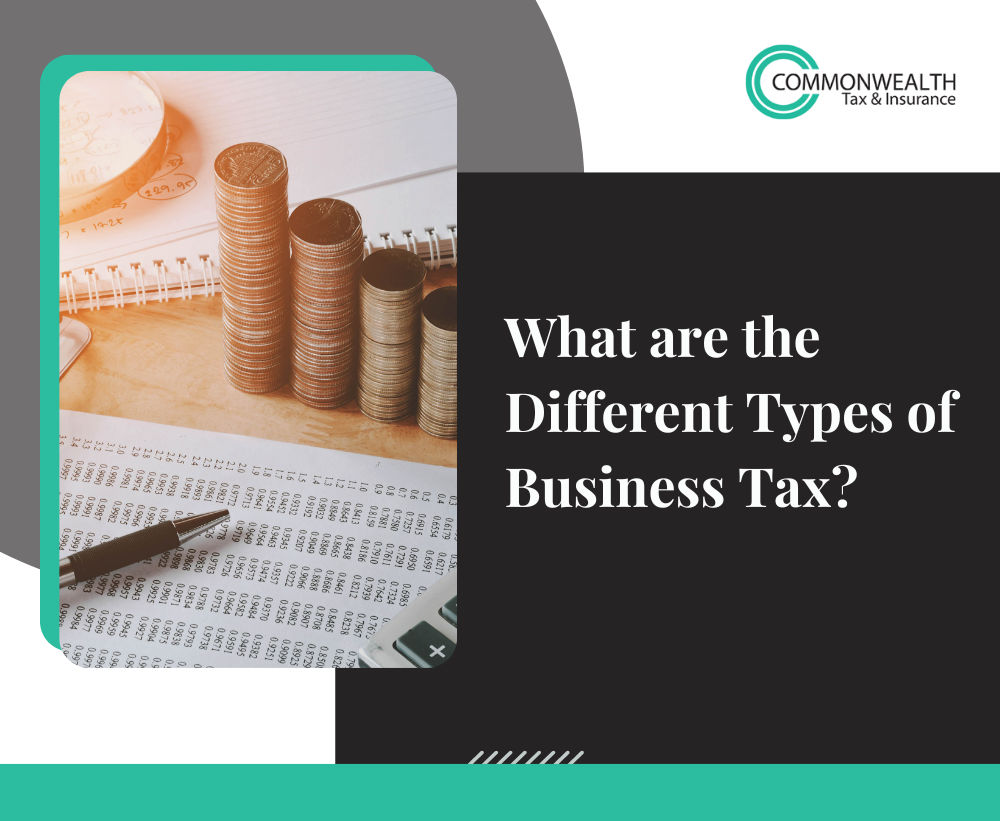What are the Different Types of Business Tax?

As a business owner, it's essential to have a solid understanding of the different types of taxes that apply to your business. At Commonwealth Tax & Insurance we are a trusted tax and financial services firm and we specialize in helping businesses navigate the complex world of taxes. Let's explore the various types of business tax and how they impact your financial obligations.
1. Income Tax
Income tax is a fundamental component of business taxation. It is levied on the net income earned by your business. The income tax rate can vary depending on the legal structure of your business. For example, sole proprietors report business income on their personal tax returns, while corporations have separate tax filings. Understanding the specific income tax rules and rates that apply to your business is crucial for accurate reporting and compliance.
2. Self-Employment Tax
If you are self-employed or operate as a sole proprietor, you may be subject to self-employment tax. Self-employment tax covers your contributions to Social Security and Medicare. Unlike traditional employees, who have these taxes withheld from their paychecks, self-employed individuals are responsible for paying both the employer and employee portions of these taxes. It's essential to calculate and set aside funds for self-employment tax to ensure compliance and avoid surprises at tax time.
3. Employment Taxes
Employment taxes encompass various taxes related to hiring employees. These include federal income tax withholding, Social Security tax, Medicare tax, and federal unemployment tax (FUTA). As an employer, you are responsible for withholding and remitting these taxes on behalf of your employees. Compliance with employment tax obligations is crucial to avoid penalties and maintain a healthy employer-employee relationship.
4. Sales Tax
A sales tax is a consumption tax imposed by state and local governments on the sale of goods and services. The specific sales tax rates and regulations vary by jurisdiction. As a business owner, it's crucial to understand whether your products or services are subject to sales tax and the applicable rates. Proper collection, reporting, and remittance of sales tax are essential to ensure compliance with state and local tax laws.
5. Excise Tax
Excise tax is a specialized tax levied on specific goods or activities. It applies to goods such as gasoline, tobacco, alcohol, and firearms, as well as activities such as gambling and air travel. The rates and rules for excise tax vary based on the nature of the goods or activities. Businesses engaged in excise-taxable activities must understand their obligations and ensure proper reporting and payment of excise taxes.
6. Property Tax
Property tax is imposed by local governments on real property, including land, buildings, and sometimes business personal property such as equipment and inventory. The assessed value of the property determines the property tax amount. Property tax rates and assessment methods vary by jurisdiction. It's essential for businesses to understand their property tax obligations and factor them into their financial planning.
7. Business License and Permit Fees
While not strictly considered taxes, business licenses, and permit fees are mandatory fees imposed by local governments for the privilege of operating a business in a particular jurisdiction. These fees vary depending on the type of business and location. Compliance with licensing requirements and payment of applicable fees are essential for maintaining a legal and operational business.
Navigating the complexities of business taxation can be challenging, but you don't have to do it alone. At Commonwealth Tax & Insurance, we offer comprehensive tax services for businesses in the central Virginia/Richmond area.
Get in touch with us today
To learn more about what we do, please click here. To contact us, please click here or call us at (804) 897-5228